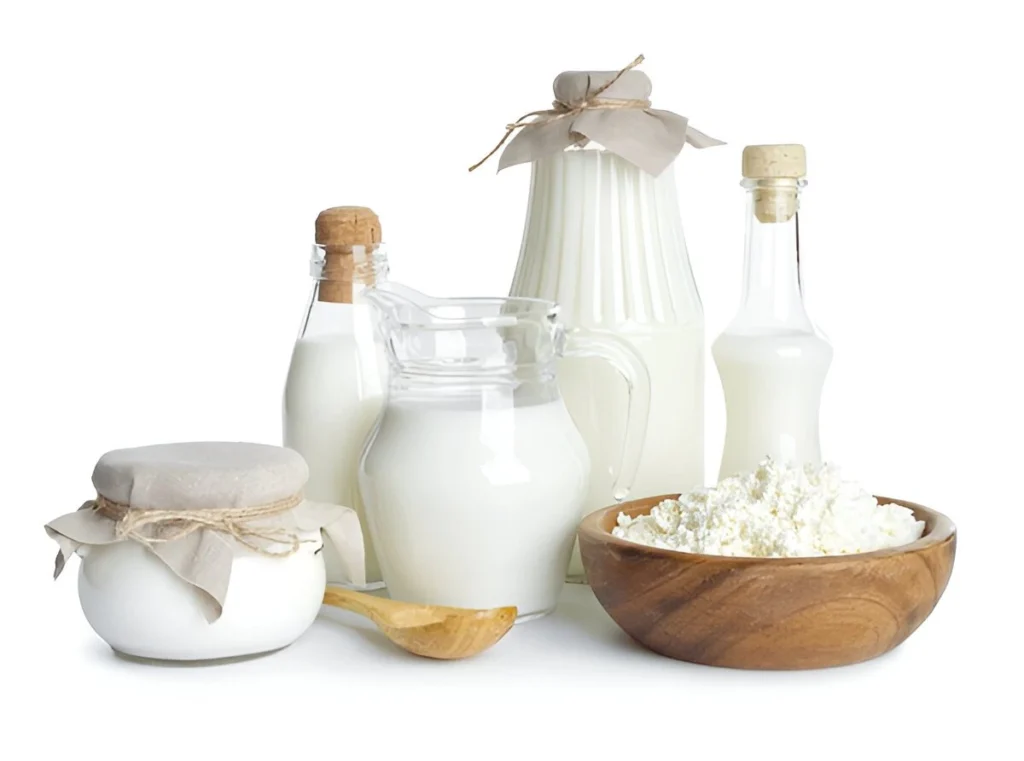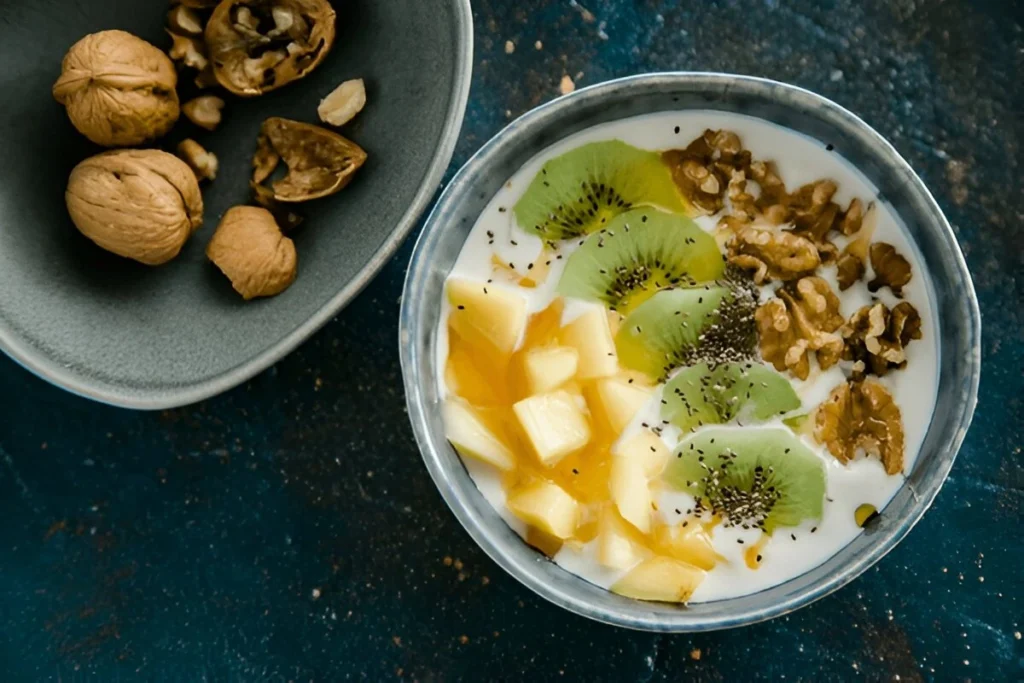What Is Kefir?
The Origins of Kefir
Kefir is a fermented dairy product, similar to yogurt, but with a more liquid consistency. It has its roots in the Caucasus Mountains, where it was initially produced by fermenting cow, goat, or sheep milk with kefir grains. These grains are a symbiotic culture of bacteria and yeast that play a crucial role in fermenting the milk, creating the tangy, probiotic-rich drink we know today. Kefir has been consumed for centuries due to its numerous health benefits.
How Kefir Is Made
Kefir is made by introducing kefir grains into milk, which then ferments over a period of 12-24 hours. The fermentation process breaks down lactose and enhances the milk’s nutrient content. The result is a drink packed with probiotics, essential vitamins, and minerals, making it a powerful addition to any diet. Kefir can also be made with non-dairy alternatives like coconut milk or almond milk for those who are lactose intolerant or vegan.
Can You Drink Kefir While Pregnant?
The Safety of Kefir During Pregnancy
So, can you drink kefir while pregnant? The short answer is yes, kefir can be a safe and healthy addition to your pregnancy diet, but there are a few important things to keep in mind. It’s essential to choose pasteurized kefir to avoid the risk of foodborne illnesses, which can harm you and your baby. Raw, unpasteurized kefir can contain harmful bacteria that may not be safe for pregnant women, so always opt for pasteurized versions.

The Nutritional Benefits of Kefir for Pregnant Women
Kefir is rich in nutrients that are vital during pregnancy. It contains calcium, protein, vitamin D, and B vitamins, which support bone health, immune function, and overall energy levels. The probiotics in kefir also promote healthy digestion and can help alleviate common pregnancy-related issues like constipation and bloating. These benefits make kefir a fantastic choice for expecting mothers looking to improve their overall health during pregnancy.
Why Kefir is Beneficial for Pregnant Women
Probiotics and Gut Health
Kefir is loaded with probiotics, beneficial bacteria that help balance your gut flora. Maintaining a healthy gut during pregnancy is crucial because it affects not only digestion but also immune health. Probiotics in kefir can reduce the risk of infections, ease digestive issues, and even reduce the likelihood of developing conditions like gestational diabetes.
Boosting Immune System During Pregnancy
Pregnancy can leave your immune system weakened, making you more susceptible to infections. Kefir contains probiotics that can help enhance immune function. Additionally, it is rich in vitamin D, which plays a key role in boosting immunity and supporting overall health. Drinking kefir regularly during pregnancy can provide a natural and gentle way to strengthen your immune system.
Kefir and Pregnancy: What the Research Says
Scientific Studies on Kefir During Pregnancy
While research on kefir specifically during pregnancy is limited, there have been studies showing the positive effects of probiotics on maternal health. Studies suggest that probiotic-rich foods like kefir can help prevent pregnancy-related conditions such as preeclampsia, gestational diabetes, and excessive weight gain. These findings support the idea that kefir can be a beneficial part of a pregnant woman’s diet.
Experts Opinions on Drinking Kefir When Pregnant
Health experts generally agree that kefir can be a healthy option for pregnant women, provided it is consumed in moderation and is made from pasteurized milk. Many nutritionists recommend kefir as part of a balanced diet during pregnancy because of its high nutrient density and digestive benefits. However, it’s always a good idea to consult with your healthcare provider before making significant changes to your diet.
Can I Drink Kefir While Pregnant?
When to Avoid Kefir During Pregnancy
While kefir is generally safe for pregnant women, there are certain situations where you should avoid it. If you have a weakened immune system or are at high risk for foodborne illnesses, it’s best to skip kefir, especially if it’s unpasteurized. Always ensure that the kefir you consume is made from pasteurized milk and stored correctly to avoid any health risks.

Risks of Kefir for Pregnant Women
The main risk associated with drinking kefir while pregnant is the potential for consuming unpasteurized kefir. Unpasteurized dairy products can harbor harmful bacteria, such as Listeria, which can cause severe illness in pregnant women and may lead to complications like miscarriage or preterm birth. Always check labels and choose pasteurized kefir to minimize these risks.
How Much Kefir Can You Drink While Pregnant?
Recommended Serving Sizes for Pregnant Women
If you’re wondering how much kefir you can drink while pregnant, moderation is key. A typical serving size is around 1 cup (240 ml) per day. This provides a good balance of probiotics, calcium, and other essential nutrients without overloading your system. Drinking more than this could potentially lead to digestive discomfort, so it’s best to start with a small amount and see how your body responds.
Potential Side Effects of Excessive Kefir Consumption
While kefir is beneficial, drinking too much of it during pregnancy could lead to bloating, gas, or diarrhea due to its high probiotic content. Overconsumption of kefir can also contribute to excessive calorie intake, which may lead to unnecessary weight gain during pregnancy. Stick to recommended servings to enjoy the benefits without the side effects.
Kefir vs. Other Dairy Products During Pregnancy
Kefir vs. Milk
Kefir offers more probiotics than regular milk, making it a superior choice for digestive health. While milk is a good source of calcium and protein, kefir provides these nutrients along with the added benefits of live cultures, which support gut health and immune function. If you’re looking for a drink that goes beyond just calcium, kefir is an excellent alternative to milk.

Kefir vs. Yogurt
Both kefir and yogurt are excellent sources of probiotics, but kefir contains a wider variety of bacteria and yeast. This diversity can offer even more excellent digestive benefits than yogurt. Additionally, kefir is more liquid, making it easier to incorporate into smoothies or drinks. Yogurt, on the other hand, is thicker and can be used in different ways, such as in parfaits or as a base for sauces.
Kefir’s Impact on Pregnancy Symptoms
Easing Digestive Issues
Pregnancy can wreak havoc on your digestive system, leading to issues like constipation, bloating, and indigestion. Kefir’s probiotics help regulate gut function and ease these discomforts. The friendly bacteria in kefir support the growth of beneficial microbes in the gut, making digestion smoother and reducing bloating.
Relieving Pregnancy Nausea
Morning sickness can be one of the most unpleasant parts of pregnancy, but kefir may help. Its probiotics and mild tangy flavor can settle the stomach and provide some relief from nausea. Kefir is also hydrating, which is essential when you’re experiencing frequent bouts of vomiting.
The Role of Kefir in Supporting a Healthy Pregnancy Diet
Nutrients in Kefir Essential for Pregnant Women
Kefir is a nutrient powerhouse packed with calcium, protein, and essential vitamins like B12, vitamin D, and riboflavin. These nutrients are crucial during pregnancy for fetal development, bone health, and overall maternal well-being. Regular consumption of kefir can help ensure you’re getting these vital nutrients.
How Kefir Complements Your Daily Pregnancy Diet
Incorporating kefir into your daily diet can help you meet your nutritional needs without the hassle of taking multiple supplements. It pairs well with other pregnancy-friendly foods like fruits, nuts, and seeds, making it easy to create a balanced meal plan. Whether added to smoothies, salads or consumed on its own, kefir is a versatile and nutrient-dense option for pregnant women.
Homemade Kefir During Pregnancy: Is It Safe?
Benefits of Homemade Kefir
Making your own kefir at home can be a great way to ensure you’re consuming a fresh, high-quality product. Homemade kefir is often more affordable than store-bought versions and allows you to control the ingredients. It’s also free from preservatives and additives that may be present in commercial kefir.
Precautions to Take with Homemade Kefir
While homemade kefir can be safe during pregnancy, it’s important to use pasteurized milk and practice good hygiene when preparing it. Always store homemade kefir in the refrigerator and consume it within a few days to prevent the growth of harmful bacteria. If you’re new to making kefir, consider starting with a small batch to see how your body responds.
Kefir for a Healthy Pregnancy: Tips and Tricks
How to Incorporate Kefir into Your Daily Diet
There are countless ways to enjoy kefir during pregnancy. Add it to smoothies for a probiotic boost, use it as a base for salad dressings, or simply drink it on its own. You can also mix kefir with fruits like berries or bananas to create a refreshing and nutrient-packed snack.
Delicious Kefir Recipes for Pregnant Women
Here are a few simple and delicious kefir recipes to try during pregnancy:

- Kefir Smoothie: Blend kefir with your favorite fruits, a handful of spinach, and a spoonful of chia seeds for a nutritious smoothie.
- Kefir Parfait: Layer kefir with granola, nuts, and fresh berries for a healthy breakfast or snack.
- Kefir Salad Dressing: Combine kefir with olive oil, lemon juice, and herbs to create a tangy salad dressing.
The Risks of Drinking Kefir While Pregnant
Potential Risks of Unpasteurized Kefir
As mentioned earlier, the main risk associated with drinking kefir during pregnancy is consuming unpasteurized versions. Unpasteurized kefir may contain harmful bacteria like Listeria, which can cause serious health problems for both you and your baby. Always opt for pasteurized kefir to ensure it’s safe for consumption.
Possible Allergies and Intolerances
Some women may be allergic to milk or lactose intolerant, which can make drinking kefir problematic. If you have a dairy allergy or lactose intolerance, consider lactose-free kefir or plant-based alternatives made from coconut or almond milk.
What If You Have Lactose Intolerance?
Can You Drink Kefir if You’re Lactose Intolerant?
If you’re lactose intolerant, you might be wondering if kefir is safe for you. The good news is that kefir is often easier to digest than regular milk due to the fermentation process. The probiotics in kefir help break down lactose, which means many people with lactose intolerance can consume kefir without issues. However, if you’re highly sensitive to lactose, you may want to try lactose-free kefir options.

Lactose-Free Kefir Options During Pregnancy
If you have lactose intolerance, there are several lactose-free kefir options available. These are made from lactose-free milk or plant-based milk like almond, coconut, or soy milk. These alternatives provide the same probiotic benefits as traditional kefir without the discomfort that comes with lactose.
Is Kefir Safe for Pregnant Women with Gestational Diabetes?
The Effect of Kefir on Blood Sugar Levels
Kefir is a low-glycemic food, meaning it doesn’t cause rapid spikes in blood sugar levels. This makes it a safe option for women with gestational diabetes. The probiotics in kefir may even help improve insulin sensitivity, which is beneficial for managing blood sugar levels during pregnancy.
How Kefir Fits into a Gestational Diabetes Diet
If you have gestational diabetes, kefir can be a valuable part of your diet. It’s a great source of protein and calcium, and it can be enjoyed as a snack or added to meals. However, as with all foods, it’s essential to monitor your blood sugar levels and consult your doctor to ensure kefir fits well into your overall meal plan.

FAQs About Kefir During Pregnancy
- Can I Drink Kefir While Pregnant if I Have Morning Sickness?
- Yes, kefir can help settle your stomach and reduce nausea. Its probiotic content and gentle texture make it an excellent choice for pregnant women dealing with morning sickness.
- Is It Safe to Drink Kefir in the First Trimester?
- Yes, it is safe to drink kefir during the first trimester if it is pasteurized. It can help with digestion and provide essential nutrients during early pregnancy.
- How Does Kefir Help with Digestion During Pregnancy?
- Kefir is rich in probiotics, which promote a healthy balance of gut bacteria. This can help alleviate common digestive issues like constipation, bloating, and indigestion during pregnancy.
- Can I Drink Kefir While Pregnant if I Have High Blood Pressure?
- Kefir can be part of a heart-healthy diet, but if you have high blood pressure, it’s important to choose low-fat or non-fat kefir to avoid excessive sodium and calories.
- Can Kefir Help with Weight Gain During Pregnancy?
- Kefir can support healthy weight gain during pregnancy by providing essential nutrients without empty calories. It’s a good source of protein, which can help manage hunger and maintain muscle mass.
- What Are the Best Kefir Brands for Pregnant Women?
- Look for kefir brands that are made from organic, pasteurized milk and are free from added sugars or artificial flavors. Popular brands include Lifeway, Green Valley Organics, and Stonyfield Organic.
Conclusion
Kefir can be a safe and nutritious drink during pregnancy when consumed in moderation. It offers a wealth of health benefits, from supporting gut health to boosting the immune system. Just be sure to choose pasteurized kefir and enjoy it as part of a balanced diet. If you have any concerns or underlying health conditions, always consult with your healthcare provider before adding kefir to your pregnancy routine.
